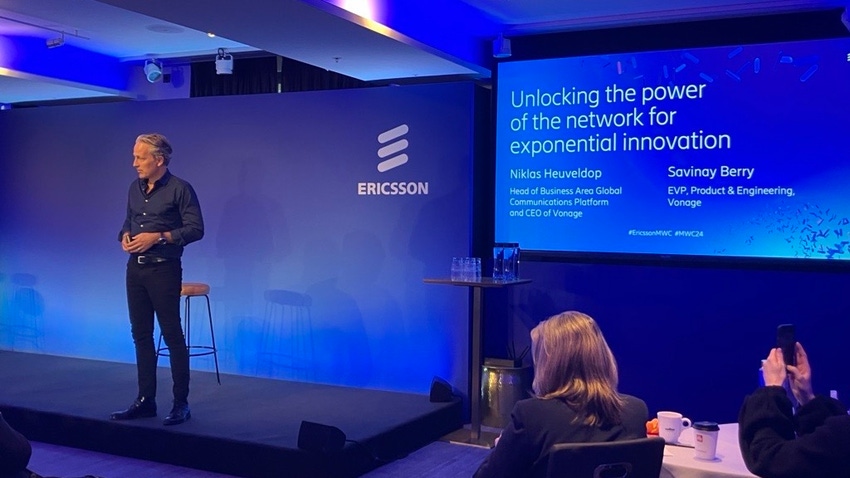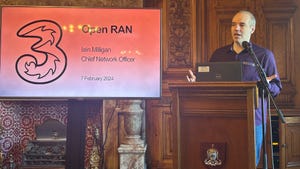Vonage remains confident about API potential
During an Ericsson event in London, Vonage officials maintained they still see a bright future for network APIs, saying operator cooperation is creating the scale needed to attract developers.

APIs are about to take off. Such, at least, is the view of Niklas Heuveldop, the newly minted CEO of Ericsson's Vonage subsidiary, and Savinay Berry, Vonage's executive vice president of products and engineering. Cooperation between operators worldwide is now helping to generate enthusiasm among developers, they said at Ericsson's recent pre-Mobile World Congress event in London.
Operators everywhere – especially in Europe – have been desperately looking for a solution or application that would allow them to monetize their massive investments in 5G infrastructure. So far, this has proven to be the modern-day equivalent of Beckett's Godot (much talked about yet never appearing), but there is now a glimmer of hope that network APIs could create a desperately needed income stream.
Network APIs are essentially tools that allow developers to leverage certain network functionalities. One example is provision of localization services, allowing businesses to check whether a device is within a pre-defined area, as shown with the example of a Magenta API powered by Vonage.
According to Berry, this could be particularly useful for IoT devices that would otherwise require GPS for localization, which consumes a lot of energy.
New APIs, new use cases
During the presentation, Heuveldop also announced that Vonage is expanding its communications platform as a service (CPaaS) solution with new APIs. These include a number verification service to replace verification SMS messages by checking the device's SIM through the network.
Apart from showcasing Vonage's own products, Heuveldop and Berry also invited Peter Arbitter from Deutsche Telekom's recently launched Magenta Business API unit to the stage.
Arbitter said his firm is in active discussions with customers, with possible use cases in fraud prevention, by determining whether customers are near a cash point, as well as drone tracking.
One specificity of the API market is that operators can work together, not against each other, in this segment, according to Arbitter. "Competition is already done, because this is defined by the SIM card distribution in the market so there we compete and now it's all around that we want to generate a new market and this unifies us."
Heuveldop insisted that this cooperation between operators worldwide will help turn the tide. He added that this is because developers are unlikely to take an interest in APIs that are only supported in one market, let alone by a single operator, and that there is now an industry-wide effort to change that.
Heuveldop pointed to the GSMA's open-source API alliance Camara, which counts major telcos and vendors worldwide among its members, as a key shift in attitude. Around 40 to 50 APIs have already been introduced through it, with developers examining what applications may be built on them.
He noted, however, that scale will have to be built gradually country by country, and pointed to the recent joint launch of APIs by Spanish operators. Earlier in February, Orange, Telefónica and Vodafone introduced online anti-fraud and identity APIs in the country as part of the GSMA's Open Gateway initiative.
Finding a monetization stream
Still, there remains some scepticism in the market, including about where the money will come from and whether APIs indeed have potential for monetization. During the Q&A session, Heuveldop and Berry were asked where the money would come from. Vonage, however, remains confident that interest from big players will generate income.
Heuveldop insisted that APIs are starting to gain traction, with AWS and Microsoft starting to engage their developer ecosystem with APIs. As an example, he cited a recent announcement of two Vonage APIs focusing on fraud security, which are to be made available on AWS's marketplace.
Ericsson and Vonage are clearly eager to make APIs a success. Having bought Vonage for $6.2 billion in 2021, Ericsson did not reap any immediate financial benefits from the purchase, as API monetization has proved difficult. Vonage's financial performance, however, doesn't offer many reasons for optimism just yet, with its sales rising only modestly, by 2%, during Ericsson's fourth quarter.
But there are other reasons why Ericsson would be eager to succeed. Telcos have recently been saying they do not want to commit to another costly infrastructure rollout once 6G comes around, given their struggles to monetize 5G. And Ericsson and Vonage are clearly aware of this.
"I have to believe that once we get the first APIs out, developers get excited, create applications, that we will see the revenue flows make their way back to the service providers so that they can continue investing in the networks," Heuveldop said, adding that this "will allow developers to build more and more services and applications and then we will hopefully see the flywheel starting to move."
Arbitter was blunter. "If we don't find ways to monetize our network infrastructure investment we have put into 5G, we don't need 6G, because we just can't afford it," he said during the Q&A session.
Read more about:
EuropeAbout the Author(s)
You May Also Like












